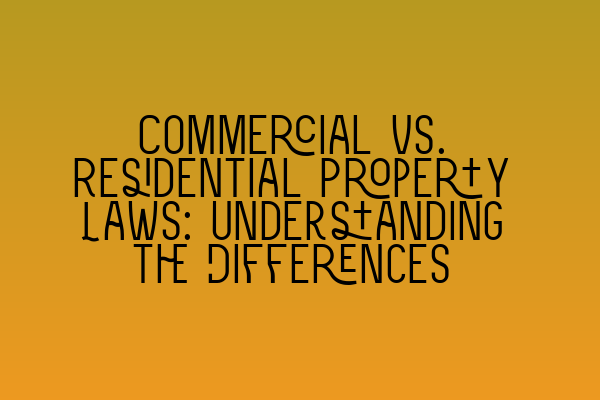Commercial vs. Residential Property Laws: Understanding the Differences
When it comes to property law, there are two main branches that every legal professional must be well-versed in: commercial property law and residential property law. While both areas deal with real estate, they have distinct differences that require specialized knowledge and expertise. In this blog post, we will explore these differences and help you understand the complexities of each.
Commercial Property Law:
Commercial property law deals with properties that are used for business or investment purposes. This can include office buildings, retail spaces, industrial warehouses, and more. The primary focus of this branch of law is on the rights, obligations, and transactions related to commercial properties.
One of the key differences in commercial property law is the complexity of the contracts involved. Commercial leases, for example, are far more intricate and detailed than residential leases. They often include clauses that govern lease renewals, rental increases, maintenance responsibilities, and other commercial-specific terms. As a solicitor specializing in commercial property law, it is crucial to pay close attention to these nuances when drafting or reviewing lease agreements.
Another significant aspect of commercial property law is zoning and land use regulations. In most jurisdictions, local governments have specific zoning laws that designate certain areas for specific types of businesses. It is essential for commercial property lawyers to understand these regulations and ensure their clients’ properties comply with them, whether it be obtaining the necessary permits or seeking variances.
Additionally, commercial property transactions, such as sales and leases, can be more complex and involve higher stakes compared to residential properties. As a solicitor in this field, you must have a strong understanding of property valuation, financing options, and due diligence procedures to protect your clients’ interests.
Residential Property Law:
Residential property law, on the other hand, focuses on properties used for housing purposes. This includes single-family homes, condominiums, apartments, and any other dwellings where individuals or families reside. While residential property law may seem less intricate than commercial property law, it presents its own unique challenges.
One of the fundamental aspects of residential property law is landlord-tenant relationships. This includes, but is not limited to, drafting and reviewing residential lease agreements, handling security deposit disputes, addressing maintenance and repair issues, and dealing with eviction proceedings when necessary. Understanding local landlord-tenant laws is vital to protect both landlords’ and tenants’ rights.
Another key consideration in residential property law is property transactions, such as buying or selling a home. These transactions involve different legal requirements, such as property inspections and disclosures, mortgage agreements, and title transfers. As a residential property solicitor, you must guide your clients through these processes and ensure their rights are protected throughout.
Furthermore, residential property lawyers often deal with property-related disputes, such as boundary disputes or nuisance claims between neighbors. These cases require effective negotiation and dispute resolution skills to reach a satisfactory resolution for all parties involved.
Conclusion:
In summary, commercial and residential property laws are two distinct branches within the field of property law. While both deal with real estate, they have their own unique characteristics and intricacies that require specialized knowledge and expertise.
Whether you are dealing with commercial or residential properties, it is essential to consult a solicitor who is well-versed in the relevant area of property law to ensure your rights and interests are safeguarded. At SQE Property Law & Land Law, our team of experienced solicitors can provide expert advice and assistance in all aspects of commercial and residential property law.
Related Articles:
– SQE 1 Practice Exam Questions
– SQE 1 Practice Mocks FLK1 FLK2
– SQE 2 Preparation Courses
– SQE 1 Preparation Courses
– SRA SQE Exam Dates
Contact SQE Property Law & Land Law today for all your commercial and residential property legal needs. Our team of solicitors is dedicated to providing exceptional service and ensuring optimal outcomes for our clients.
